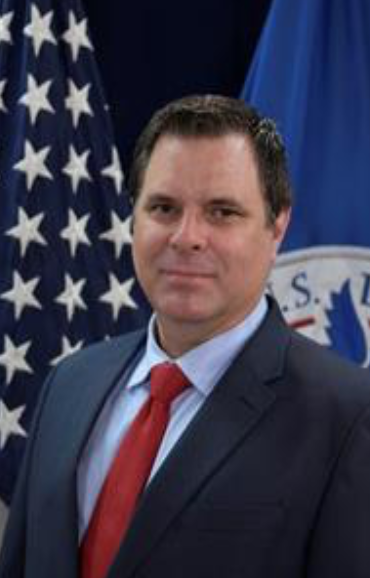
Frank Wuco, now a senior arms control adviser at the State Department, dressed as his jihadist alter-ego Fuad Wasul.Internet Archive
On Thursday, CNN reported that Rev. Jamie Johnson, a senior official at the Department of Homeland Security, had once said that Islam had given the world only “oil and dead bodies.” He had also argued that Jews became disproportionately wealthy through hard work while African Americans turned cities into “slums because of laziness, drug use, and sexual promiscuity.” Hours later, Johnson resigned as the head of DHS’s Center for Faith-Based and Neighborhood Partnerships.
But Frank Wuco, a senior White House adviser at DHS who has made similarly inflammatory comments about Muslims and other groups, is still working at the department in a role with significant implications for Muslims in America and abroad. Earlier this month, Mother Jones reported that Wuco has been in charge of implementing President Donald Trump’s executive orders at DHS since April. Those orders have included bans on travelers from some majority-Muslim countries.

Frank Wuco.Courtesy of DHS
Like Johnson, Wuco has described Islam as a fundamentally violent religion. Johnson said that he doesn’t consider Muslim terrorists to be followers of “radical Islam” but rather “obedient Islam.” After the Pulse nightclub shooting in Orlando last year, Wuco told Steve Bannon’s Breitbart there was “nothing radical” about the shooter. “He is a Muslim who is following the strictures of Islam and its guidance and prescriptions for violence and warfare against unbelievers,” Wuco explained on camera.
Wuco’s website once claimed that while Muslims in other parts of the world were “perfectly happy to subjugate and humiliate non-Muslim members of their societies,” Muslims in the West were more likely to create Shariah-law enclaves that they would use to conquer the world.
At DHS, Johnson was tasked with helping emergency managers to work with the faith community in the wake of disasters—a job that could easily be undermined by comments offensive to black and Muslim communities. Similarly, Wuco’s work on executive orders involving Muslims could be influenced by his strong views and statements on Islam. But Wuco’s role is arguably the bigger one, with implications for national security and relations with the Muslim world.
In March, after his earlier travel ban was blocked in court, Trump issued an executive order directing DHS to provide him with a list of countries whose citizens should be banned from traveling to the United States. Five months after Wuco started running DHS’s executive order task force, the department recommended restrictions on seven countries: five majority-Muslim nations, as well as North Korea and Venezuela. In a September proclamation, Trump followed the department’s advice.
For a man whose role involves assessing security threats, Wuco has been quick to conclude—sometimes falsely—that attacks were perpetrated by Muslims. In 2011, Wuco incorrectly assumed that a Muslim was responsible for a mass-shooting in Norway that killed 77 people. He said he was “disgusted” that Muslim Americans pushed back against false reports that Islam had played a role. The next year, when a gunman opened fire in a movie theater in Aurora, Colorado, he wrote on his blog that the attack was “eerily similar” to a novel that features a Muslim terrorist who blows up a crowded movie theater. All of his “suspicions,” he wrote, were “so obvious that I will avoid the rush to lay them out there.” Later that day, the shooter’s identity was revealed. He was not Muslim.
After a 2010 plot to kill the Pope was foiled, Wuco’s blog explained the Muslim plotters’ motivation:
1) He’s NOT going to accept Islam
2) He’s NOT going to submit and pay the non-Muslim poll tax (jizya… sounds gross, I know)
3) That means… SLAY HIM, such is the reward of those who reject faith
Wuco’s rhetoric on African Americans has been less extreme than Johnson’s. But in 2012, he charged the NAACP and Congressional Black Caucus with inventing racism and said he found the CBC’s existence “shameful” in the 21st century. “Real racism,” he suggested, was largely a thing of the past.
Prior to joining DHS, Wuco hosted a radio show on which he sometimes highlighted the deaths or arrests of terrorists as “wargasms.” (On one occasion, he was accompanied by a sultry slow-jam; on another, he moaned, “Mmm baby, oh baby baby, mm, give it to me baby.”) Wuco also donned Middle Eastern garb and a fake accent to role-play as a fictional jihadist named Fuad Wasul in order to explain how he believes Muslims think:
A video of Frank Wuco playing Fuad Wasul. Credit: Larry Willette/Vimeo
Before Johnson resigned, Tyler Houlton, a DHS spokesman, told CNN that “the administration does not support these statements made by Rev. Johnson, some of which were said nearly a decade ago.” Houlton also praised the work that Johnson did with the interfaith community while at DHS. After Johnson resigned, Houlton added that Johnson’s comments “clearly do not reflect the values of DHS and the administration.”
In October, Houlton told Mother Jones that Wuco was “a valuable member of the DHS team” and declined to say whether Wuco’s views on Islam affect his ability to work on issues that impact Muslims.
DHS did not respond to a request for comment from Mother Jones about whether Wuco’s comments about Islam reflect the department’s values.







